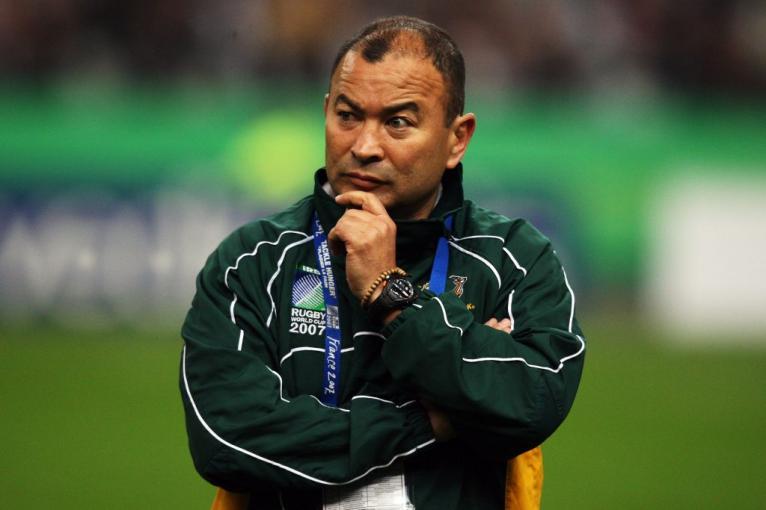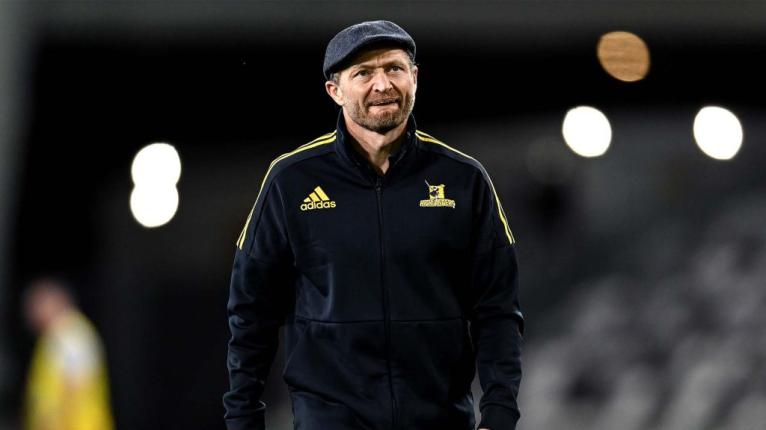Back in 2007, South Africa recruited Eddie Jones as a technical advisor ahead of their World Cup campaign in France. The Springboks harnessed their traditional kicking and defensive strengths to win that tournament, but in the aftermath, the players credited Jones for adding another dimension to the team’s attack.
The Australian would later bemoan the untapped potential in South African rugby.
“Mate, if they ever get it right, the rest of the world are in big trouble,” he said in 2010.
Shortly after the Boks beat Jones’ England 32-12 in the 2019 final, the coach made a similar comment in his autobiography.
“South Africa is the sleeping giant of world rugby and could grow into an ever-greater superpower if they maintain their development programmes,” he wrote.

Some might say Jones’ prophecy has already come to pass. Since Rassie Erasmus took the reins as South Africa’s director of rugby in 2018, the provinces have aligned and agreed to put the interests of the national team first. As a result, the Boks became the second nation to claim back-to-back World Cups and the first to lift the trophy on four separate occasions, while also earning a series victory against the British and Irish Lions.
And yet, there’s a feeling in South Africa the best is yet to come and the Boks are yet to realise their full potential, particularly in the attacking department.
Erasmus and Jacques Nienaber backed a number of attack-minded players over the past six years – Cheslin Kolbe, Kurt-Lee Arendse and Manie Libbok to name a few. While the side has delivered several sparkling showings in isolation – last year’s performance against the All Blacks at Twickenham as well as the World Cup quarter-final against France come to mind – their conversion rate and overall approach have left much to be desired.
I feel like I grew a lot after spending just one season as Tony Brown’s inside centre.
That they have the talent to play total rugby is not in doubt. How do they unlock that potential, improve their attacking strike rate, and become a truly balanced side with the ability to outscore rivals such as Ireland and New Zealand on a regular basis? It’s a question Erasmus and his lieutenants have pondered for some time.
Going by the recent additions to the Bok coaching staff – Tony Brown (attack) and Jerry Flannery (defence) – the collective is set for a significant shift in mindset ahead of the 2027 World Cup, where they will be gunning for an unprecedented hat-trick.
These are exciting times for the Boks. While Brown and Flannery’s job titles may differ, their individual relationships with Erasmus as well as their ambitious philosophies should make for a particularly potent attacking cocktail.
Erasmus and Brown competed against one another in the late 1990s, at Super Rugby and Test level. When Erasmus took the head coach job at the Stormers in 2008, and set about rebuilding the franchise, he asked Brown to join as a player-coach.
Jean de Villiers remembers the impact of Brown’s arrival. By that stage, De Villiers was an established Test player en route to over a 100 games apiece for the Stormers and Boks. Nevertheless, when the former All Blacks fly-half walked through the door, he hung on to every word that was said.
“TB was so competitive, and it seemed like he was always trying to do something new,” De Villiers says.
“Having him there challenged the rest of us to reassess how we thought about the game. I remember how much Peter Grant learned from Tony [Grant made his Test debut at fly-half later that season] and I feel like I grew a lot after spending just one season as his inside centre. He was there for a relatively short time, but he added a lot of value.”

Erasmus left the Stormers in 2012 to become SA Rugby’s high performance manager. In 2016 and 2017, he worked alongside Nienaber, Felix Jones, head of athletic performance Aled Walters and Flannery at Munster. All of those coaches shared Erasmus’s philosophy, and three of the four followed him back to South Africa when he got the Bok job in 2018.
Meanwhile, Brown’s legend as an innovator grew as he continued to make an impression with the Highlanders and Japan. In 2019, Erasmus name-checked Brown in the lead-up to the World Cup-warm-up match against the Brave Blossoms. Thereafter, he made a bold prediction: Japan would qualify for the World Cup quarter-finals.
Erasmus was confident Brown’s attacking plan would trouble most defences, and as it happened, the host nation beat Ireland and Scotland to top their pool, and set up a showdown with the Boks. Japan gave South Africa a few scares, but the eventual champions prevailed 26-3 – and went on to win the tournament.
Over the next four years, Erasmus hinted he was in the market for another assistant coach, possibly from a foreign country. Most in South Africa felt he was being overly ambitious when he dropped the names of Wayne Smith and Scott Robertson.
Jerry actually spent some time with us in the 2023 World Cup preparation. He understands how the environment operates and the players would know him.
When Brown’s name was mentioned late last year, a lot of people wondered why another New Zealand legend would join the All Blacks’ fiercest rivals, or whether his attacking philosophy would align with that of Erasmus.
As it turns out, the move has been on the cards for some time.
“Rassie doesn’t leave anything to chance,” says De Villiers. “There’s been a lot of talk about Tony and Jerry joining the Boks over the past few months, but you can bet your bottom dollar Rassie was planning this a long time ago.
“Even before the 2023 World Cup, he would have looked at the playing group and where they were, looked at where they could be in future, and then looked at who or what they needed on board to realise that goal.”
The key, as De Villiers suggests, is introducing new methods and ideas without compromising the platform built over six years.
“We need to acknowledge the contributions of Nienaber and Jones,” says the former Bok captain. “Both worked very well together as the defence and attack coach, and as part of Rassie’s wider coaching team. In any scenario, it’s going to be hard to replace that, in terms of the quality of the individuals and what they add to the collective.
“Fortunately, Rassie has already worked with Tony at the Stormers and Jerry at Munster. It’s tough to replace a relationship like the one Rassie had with Jacques – which stretches back to the 90s – but with Jacques and Felix leaving, there’s suddenly an opportunity to implement new coaches and fresh ideas. Every team needs that once in a while.
“Tony made such a big impression on Rassie and the Stormers players 15 years ago. Since then, he’s continued to grow as a coach, and has added layers and layers of experience. It’s encouraging to think all that IP will be at the Boks’ disposal over the next four seasons.”

Willie le Roux (34) is unlikely to feature in 2027. However, veterans such as Handré Pollard, Damian de Allende, Lukhanyo Am, and Kolbe should still be around, while Damian Willemse, Canan Moodie, Libbok and Arendse will be in their prime.
“As good as the Boks were at the World Cup, the backline players must be relishing the chance to work alongside someone like Tony,” notes De Villiers. “It’s a massive appointment if you think it may rekindle the fire of those senior players while boosting the development of those younger stars.”
With Brown in tow, South Africa will ask more questions of the opposition defence than ever before.
“The Boks won back-to-back World Cups by harnessing their traditional strengths, and if Tony can add another layer to their attack, they will be so much more dangerous in the seasons to come. He has a reputation for innovation and has successively implemented a lot of trick plays over the years.
“Put it this way, if the Boks are generating more attacking options and posing more threats, they are that much harder to analyse and ultimately that much harder to stop. We’ve seen how Tony has added another dimension to the approach of every team he’s coached, and he’ll have the same mandate at the Boks.”
The relationship between the attack coach and defence coach is so important. They have a good idea of how the defence manipulates the attack and vice versa
Filling the void left by Nienaber will be easier said than done. Flannery, however, is a self-confessed Nienaber disciple, having spent his formative coaching years under the South African at Munster. While he’s become an outstanding coach in his own right, he freely admits to implementing a few of Nienaber’s methods at Harlequins.
Nienaber himself feels that Flannery will be an excellent fit.
“He would be very familiar with the way Rassie would do stuff, because it will be very similar to how we did things when we were at Munster,” the former Bok head coach, who is now with Leinster, told The Independent.
“Jerry actually spent some time with us in the 2023 World Cup preparation. He was there a week or two with the Boks. He understands how the environment operates and the players would know him.
“I think both of those appointments, Jerry and Tony Brown, are excellent appointments. They will add value to the team.”
De Villiers believes the Irishman will slot right into the Bok setup.
“Like TB, Fla is just a terrific human being. We met when I played for Munster in the 2009-10 season. He was recovering from an injury, and he didn’t mind taking me down to the pub in Limerick.
“The relationship between the attack coach and defence coach is so important. They have a good idea of how the defence manipulates the attack and vice versa – they have to work closely together. Jacques and Felix were very close during their time with the Boks, and were very successful as a combination.
“Can Jerry and Tony gel in the same manner? Time will tell, but having a common denominator in Rassie will help a great deal.”



Comments
Join free and tell us what you really think!
Sign up for free